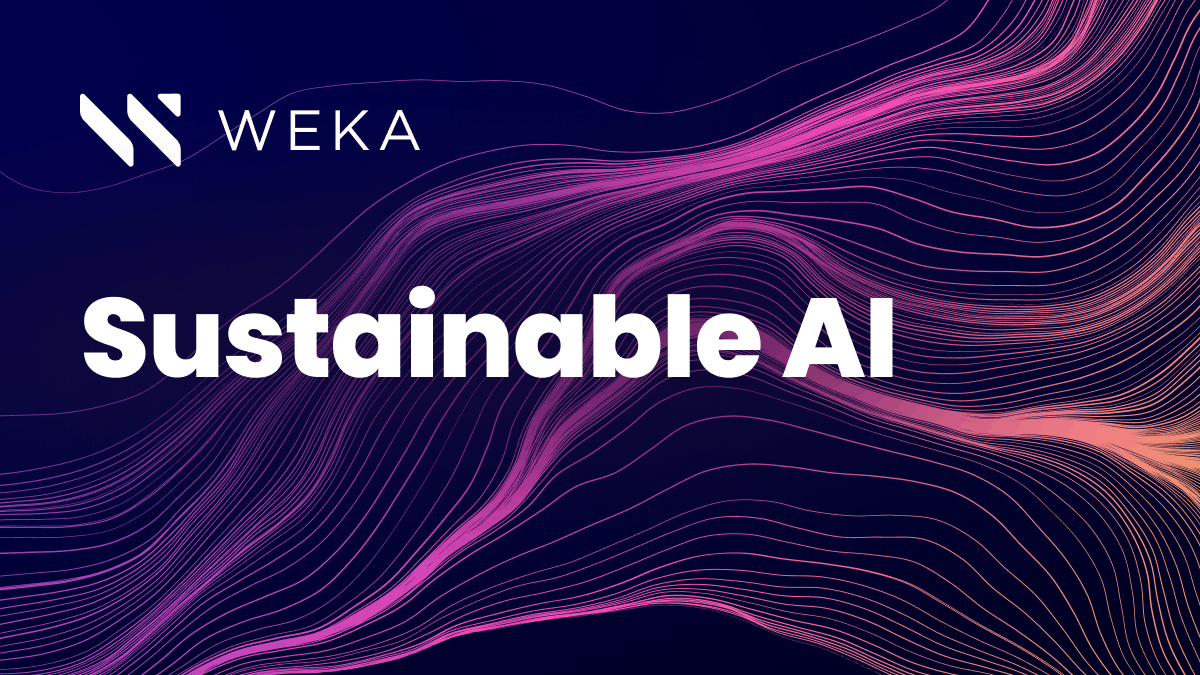Solving the AI Sustainability Conundrum

AI is unquestionably one of the most transformational technologies of our time. Beyond the unfathomable potential and wonder of ChatGPT that is dominating headlines each day, AI is driving significant, tangible benefits for industries and societies worldwide. Whether it’s accelerating critical disease and vaccine research or fueling the future of autonomous vehicles at digital speed, unearthing genetic and genomic insights, or powering previously unimaginable discoveries about our universe, AI is continually turning science fiction into science facts before our very eyes.
It’s no wonder then that the World Economic Forum believes AI holds the key to solving many of the most pressing social, environmental, economic, and humanitarian challenges of our time, including mitigating the harmful effects of climate change and solving the global energy crisis.
However, every next-generation technology can potentially introduce unintended consequences that must be considered. For AI, these range from unintentional bias and the potential to violate personal privacy to waging biological warfare, creating chaos in the power grid, and raising an army of killer robots to enslave humanity.
But this post will not be yet another missive on AI ethics sustainability. Thanks to a robust and prolific public discourse around its ethical and privacy considerations, scientists are working around the clock on AI sustainability projects to make AI safer and fairer, rooting out its potential dark side, which (we hope) will help us to avoid at least the killer robot scenario.
The bad news?
AI has a dirty secret that could have catastrophic impacts on humanity and our planet – and no one is talking about it. As it turns out, our most promising tool for solving the world’s climate and energy crises is among their worst offenders.
Although AI and its siblings, machine learning (ML) and high-performance computing (HPC), have the potential to help us address the most profound challenges facing our world today, they are also contributing to near-exponential increases in power consumption and carbon emissions, accelerating and intensifying the very issues we hope they can help us solve.
These digital transformation engines are voraciously energy-hungry and carbon-intensive, requiring a veritable ocean of streaming data to fuel them. Traditional data architectures only compound the issue by causing latency and bottlenecks in the data pipeline that leave the graphical processing units (GPUs) that power performance-intensive workloads underutilized up to 70% of the time, idling as they wait for data to run.
Imagine you’re stuck in a traffic jam on the freeway. As your car inches along, you’re not only wasting time and patience, but more importantly, you’re burning fuel and spewing pollution into the air to go nowhere. This is what’s happening in the world’s data centers every day that we don’t find ways to make AI and ML models and HPC workloads run more efficiently.
The energy and carbon implications of these technologies can no longer be ignored.
This is not just marketing hype intended to drive news cycles for a time, only to be replaced with Harry and Meghan’s next book release. Even our industry’s top analyst firms are weighing in.
Gartner predicts that “By 2025, without AI sustainability practices, AI will consume more energy than the human workforce, significantly offsetting carbon-zero gains.”
The AI sustainability conundrum is a pressing issue – one that we must collectively commit to solving in the immediate term. Our planet is under severe stress. The horizon to course correct before we reach the point of no return is looming. Killer robots should be the least of our worries. Although reality may seem more benign, it’s just as fearsome: AI may very well be humanity’s undoing if we don’t tame its insatiable energy demands and curb its carbon footprint.
WEKA recognizes the urgent need to not only consider AI’s potential to solve business and societal challenges but also to raise awareness for the impact of AI in environmental sustainability and help unite the scientific, business, political, and technology communities we work with each day to solve for it.
That’s why today we are launching our Sustainable AI Initiative, to put a bright spotlight on the grave — but fixable — environmental impact of AI and facilitate problem-solving so society can harness its immense potential for good. Through this initiative, we will make climate-positive investments, like our partnership with One Tree Planted, igniting industry and societal conversations and collaborating to solve problems and promote more efficiency and sustainability in AI.
Turning the tide on climate change will require global action on many fronts, but abatement of the energy and greenhouse gas emissions associated with AI and enterprise technology stacks is one way CEOs, CIOs, and CDOs can take action today to reduce their companies’ carbon footprint in support of their AI sustainability goals. If the analysis coming out of Davos this year is true, it’s not just the right thing to do for the planet – sustainable AI and green technology investments are also good business.
This is merely a first step. There’s much more work to do and many conversations to be had. WEKA is committed to helping move AI sustainability all forward. Watch this space.


